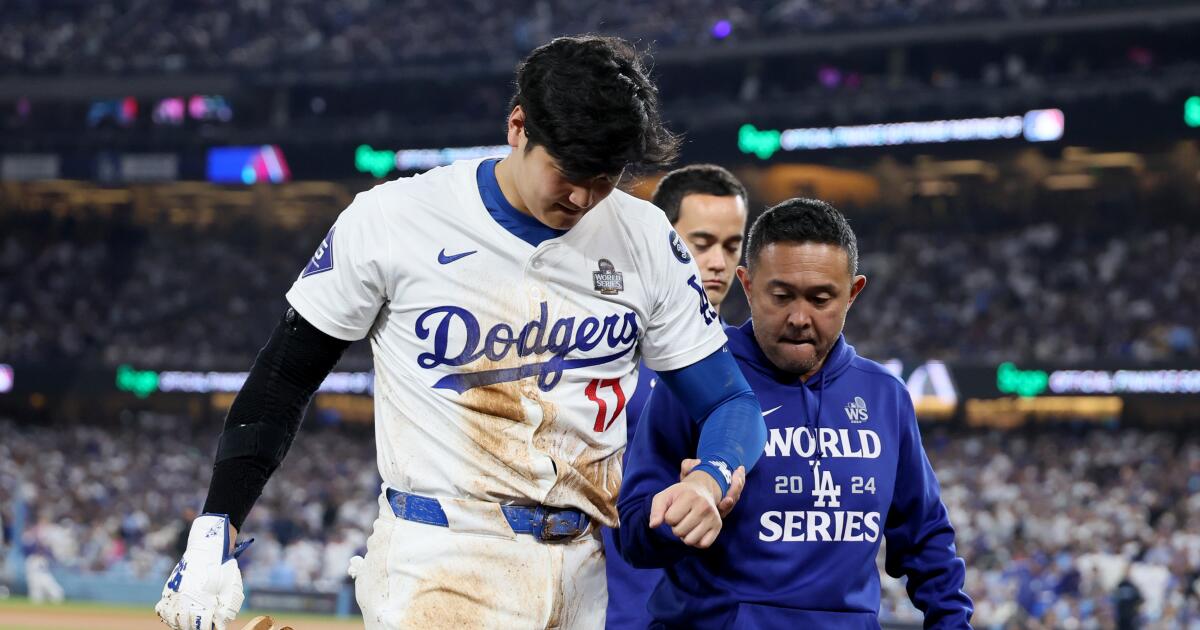Suddenly, the party stopped.
Shohei Ohtani was on the ground, writhing in pain after he was caught stealing second base in the seventh inning.
Dodger Stadium was silent.
When Dodgers trainer Yosuke Nakajima reported to the scene, the Fox broadcast picked up their conversation in Japanese.
“It’s the shoulder,” Ohtani said.
“What?” Nakajima asked.
“Shoulder.”
“Which shoulder?”
“Left.”
“Did it come off?” Nakajima asked.
“Probably,” Ohtani said.
The initial diagnosis provided by manager Dave Roberts: a subluxation, or partial dislocation, of the left shoulder.
Considering they extended their lead in the World Series to two games to none, the Dodgers were relatively somber in the wake of their 4-2 victory over the New York Yankees on Saturday night.
As encouraged as Roberts claimed to be about Ohtani’s condition, there was a very real possibility the Dodgers would have to play the remainder of the Series without the best player in baseball.
“When you see him come off the field with a trainer holding his arm, obviously a level of concern,” first baseman Freddie Freeman said.
Roberts acknowledged he would remain uncertain until Ohtani underwent an MRI examination. The best-of-seven series resumes Monday at Yankee Stadium.
Regardless of what the test reveals, the Dodgers should win this World Series.
Their starting pitching is comparable. Their bullpen is much better. Their lineup is also much better, even without Ohtani.

The Yankees’ answer to Ohtani, Aaron Judge, might as well not be playing, as he is hitting just .150 in this postseason. In the first two games of the World Series, Judge is one for nine with six strikeouts.
There’s more at stake than this Series, however.
“Personally,” outfielder Teoscar Hernández said in Spanish, “I don’t want him to miss the final games of the season.”
This is the Year of Ohtani. He has been the sport’s most important story at every stage of the season, from the Dodgers’ season-opening series in South Korea to when he became the first player in history to hit 50 homers and steal 50 bases in a season.
Ohtani is more than the face of baseball. He is baseball.
How much of a downer would it be if he’s reduced to being a spectator when the Dodgers win the World Series?
Hernández and the other Dodgers know better than anyone what he has invested in this season, how he simultaneously rehabilitated his surgically repaired pitching elbow while preparing himself to put up the kinds of offensive numbers that should win him his third most valuable player award. Of course they don’t want him to miss these games.
“Hopefully, he can play,” Hernández said.
Roberts wasn’t ready to acknowledge Ohtani might not play again this postseason.
“I’m expecting him to be in the lineup,” Roberts said.
But if Ohtani is not, the Dodgers should have the necessary firepower to continue dominating the Yankees.

Dodgers star Shohei Ohtani walks off the field after sustaining a left shoulder injury in Game 2 of the World Series on Saturday.
(Robert Gauthier / Los Angeles Times)
“We can take care of business for sure,” outfielder Mookie Betts said.
They survived an extended stretch without Betts. They survived multiple stretches without Freeman. They can survive a few games without Ohtani.
“They’ve picked me up when I was down and we’ll try to do the same for him,” Freeman said.
They already have. In the first two games of this World Series, Ohtani was one for eight. The Dodgers won both games.
Two minutes after their victory Saturday night, Ohtani departed the clubhouse. By his side were a security guard, Nakajima and interpreter Will Ireton. Ohtani held his belongings in his right hand and nothing in his left.
“Would you be able to hold these?” he asked Ireton.
Ohtani went into an elevator, his role over the remainder of this Series still undetermined.
He should win the World Series he imagined winning from the time he was a high school superstar in the Japanese countryside. He should receive the championship ring that will bolster his Hall of Fame credentials.
But this might not happen how he, or anyone else, dreamed it up.

